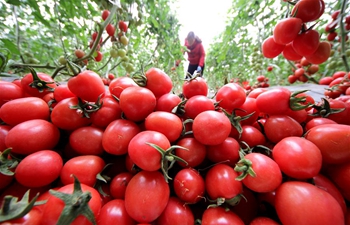by Kaula Nhongo
WINDHOEK, March 6 (Xinhua) -- The lack of basic services in Namibia's informal settlements has resulted in a disease outbreak crisis where health authorities have warned that if the situation is not controlled, it will have devastating effects in the near future.
Nationwide, informal settlements have been struggling with a Hepatitis E outbreak since September 2017 where over 4,000 cases have been recorded with about 40 deaths.
According to health officials, the situation can be considered as a crisis seeing that about 40 percent of Namibia's population reside in informal settlements.
According to the statistics released in 2018, there were 308 informal settlements in Namibia, with a staggering 228,000 shacks accommodating about 995,000 people in urban areas.
Since the settlements are illegal, service provision is limited.
In the capital city Windhoek, the most affected areas include Havana, Goreangab Dam, Hakahana, Greenwell Matongo and Ombili.
Just recently, more cases were detected in the coastal town of Swakopmund where 160 cases have so far been reported since July last year.
Hepatitis E is a liver disease caused by infection with a virus known as hepatitis E virus (HEV). According to the World Health Organization, there are an estimated 20 million HEV infections worldwide every year. It estimated that hepatitis E caused approximately 44,000 deaths in 2015.
The virus is transmitted via the faecal-oral route, principally via contaminated water.
Poor sanitation, open defecation, and unsafe water sources were blamed for HEV infections in Namibian informal settlements.
Martha Hango was one of the first cases to be detected in Windhoek in 2017 but has since recovered.
The 36-year-old mother lives in a corrugated iron shack in the Havana Informal settlement in Windhoek, one of the severely affected places.
Her residence is located just near a riverbed which most people use to relieve themselves as there are no toilet facilities in the area except for a few that individuals have constructed on their own homesteads.
For the past seven years, the mother of one has been living in the filth of Havana after moving to the city from the north in search of a better life.
"I moved here to work, but after getting to Windhoek I could not find cheap accommodation so I decided to reside here illegally. At least I have a roof over my head even though I know that we are not allowed to be living here," Hango said.
Hango says since the outbreak, nothing in her location in terms of provision of basic services has changed.
"It is the same story every year, city officials come and promise to construct toilets and erect more water points but nothing ever happens. More and more people will keep getting sick, no one cares about the poor. We are on our own," she said.
The residents have no running water at their residences thus they have to get water from a water point installed by the municipality.
For one to get access to this water, they need to have a water card from the city.
She struggles to get water because the municipality does not issue water cards to residents who do not have house numbers thus she has to rely on friends to get water which she keeps in containers in her house.
At times, when her friends also do not have water, she has to get water from the streams in the area which are suspected to be contaminated with sewerage water.
The Ministry of Health and Social Services has reported that investigations on the cause of the outbreak revealed that the containers that people use to fetch water contain faecal particles.
Speaking at the relaunch of the Hepatitis E campaign in the coast this week, the country's health advisor Bernard Haufiku urged the government to act swiftly as the situation was fast becoming a crisis.
"We must work to solve the problem otherwise we will be managing crisis after crisis," Haufiku said.
Since the outbreak, the Ministry of Health and Social Services has been distributing disinfectant soap and bacteria-killing tablets in the affected areas.













